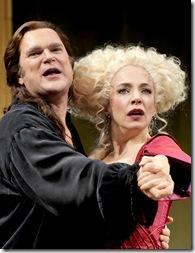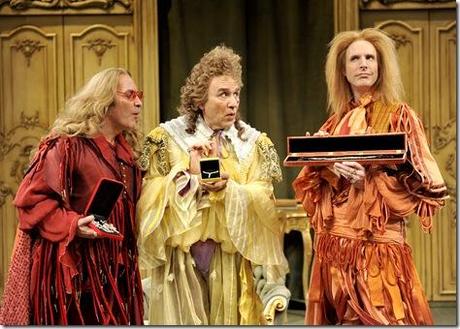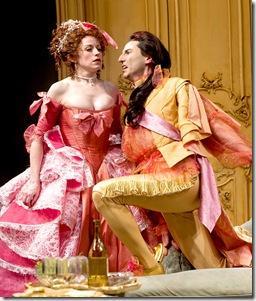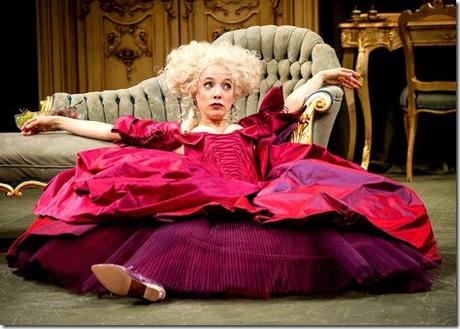
The School for Lies
Written by David Ives
Directed by Barbara Gaines
Chicago Shakespeare Theater, Navy Pier (map)
thru Jan 20 | tickets: $58-$78 | more info
Check for half-price tickets
Read entire review
A quick and quirky excursion to 17th Century Paris

Chicago Shakespeare Theater presents
The School for Lies
Review by John Olson
I’ve sometimes pondered if those whose native tongue is something other than English have an advantage over English speakers in experiencing Shakespeare. Surely the French, for example, read translations of the Bard in contemporary French rather than some French imitation of Elizabethan English. And while they may miss the unique beauty of Shakespeare’s language, at least they would not have to struggle to understand an archaic form of their native tongue. For better or worse, we English speakers must deal with the challenges and rewards of Shakespeare’s 16th century, but with The School for Lies, Chicago Shakespeare Theater is giving us a chance to switch sides with the French and hear one of the greatest 17th Century French comedies in contemporary English – and American English at that! David Ives’ play is what he calls a “translaptation” of Molière’s The Misanthrope. He makes the distinction because – while he has retained the characters and general situation of Molière’s play – he’s added scenes as well as translated it into our language and idioms. The script keeps the action in the year 1666 and the language in rhyming couplets a la Molière. This faithfulness to The Misanthrope’s style, together with a visual design that updates but riffs on 17th Century salon attire, allows us to imagine ourselves back in 17th Century Paris, enjoying the play much as the Parisians of that era might have.

This farce is made entertaining by the comic skills of a cast of classically trained actors under the fast-paced, physical direction of CST Artistic Director Barbara Gaines. Carlson has considerable charisma as the strong-willed Frank who, though an outsider to this court, quickly has the women enraptured and the men threatened. Carlson conveys the contradictions in this man, who claims to possess complete honesty and superiority to the others, yet deceives and is deceived as much as any of them. Hay (like Carlson, a veteran of Canada’s Shaw and Stratford festivals) gives Celimene a charming vulnerability – she’s neither so wise nor ruthless as she appears. Fortunato’s Philinte is the play’s most likable and honest man among these liars. Fortunato conveys that goodness along with a flair for physical humor and a way of carrying himself in a gown when he decides to live out the lie Frank created for him. Kettenring gives a great reading of the flighty and sexually frustrated Eliante. Rounding out these three is Arsinoé – a self styled exemplar of high morality who seeks to undo Celimene. Arsinoé is given a wicked regality by Judith-Marie Bergan. The trio of comic suitors who hover around Celimene are all delightfully played. Greg Vinkler is the haughty poet who is belittled by Frank and thus seeks to have him deported; Kevin Gudahl is a hilariously simple yet rich marquis and Paul Slade Smith is a clueless courtier. Samuel Taylor plays the dual role of the hapless servant to Celimene who is repeatedly frustrated in his attempt to serve canapés to the guests; and Basque – Frank’s simple valet.
Even funnier than the characters, though, particularly in the first act, are the couplets Ives devises. He seems to deliberately struggle to find rhymes to fit his needs. He uses every type of rhyme imaginable – identical, near, internal, you name it. Much of the script’s humor comes from the audience’s suspense in wondering just how Ives is going to complete a rhyme. It’s a lot like the humor of some short-form improv games in which audience is impressed not so much that the rhymes are good, but that they have been made at all.
While the set by Daniel Ostling feels authentically 17th Century upper-class Paris, Susan E. Mickey’s costumes are wild, contemporary variations of that era’s apparel. While they evoke the period, they have an audacity that reminds the audience that we’re here to have fun, establishing the setting of the play as some cartoonish never-never land. The costumes are topped by some spectacularly large wigs for women and men alike, designed by Melissa Veal (who designed the make-up as well). Just as the costumes add a contemporary touch supporting Ives’ anachronistic and contemporarily urban crude language, the original music by Lindsay Jones opens and closes each act with an electronic baroque sound that tells us we’re in some sort of hybrid world of past and present.
It’s that dichotomy between past and present that makes The School for Lies such a worthwhile lesson. We can experience Molière’s milestone of classical theatre – in style and form quite different from most of what we watch these days – but laugh at the humor that has contemporary resonance. It’s a light confection that makes an enjoyable two-hour vacation thanks to some twisted time travel.
Rating: ★★★½
The School for Lies continues through January 20th at Chicago Shakespeare Theater, Navy Pier, 800 E. Grand (map), with performances Tuesdays thru Sundays at 7:30pm, plus matinees on Wednesdays at 1:00pm, Saturdays at 3pm, and Sundays at 2pm. Tickets are $58 – $78, and are available by phone (312-595-5600) or online through their website (check for half-price tickets at Goldstar.com). More information at ChicagoShakes.com. (Running time: 2 hours 15 minutes, includes an intermission)

Photos by Liz Lauren
artists
cast
Sean Fortunato (Philinte), Paul Slade Smith (Clitander), Ben Carlson (Frank), Samuel Taylor (Dubois, Basque), Greg Vinkler (Oronte), Deborah Hay (Celimene), Heidi Kettenring (Eliante), Kevin Gudahl (Acaste), Judith-Marie Bergan (Arsinoé).
behind the scenes
Barbara Gaines (director), Daniel Ostling (scenic design), Susan E. Mickey (costume design), Philip S. Rosenberg (lighting design), Lindsay Jones (original music and sound design), Melissa Veal (wig and make-up design), Rick Sordelet (movement consultant), Bob Mason (casting), Deborah Acker (production stage manager), Liz Lauren (photos)
12-1222

